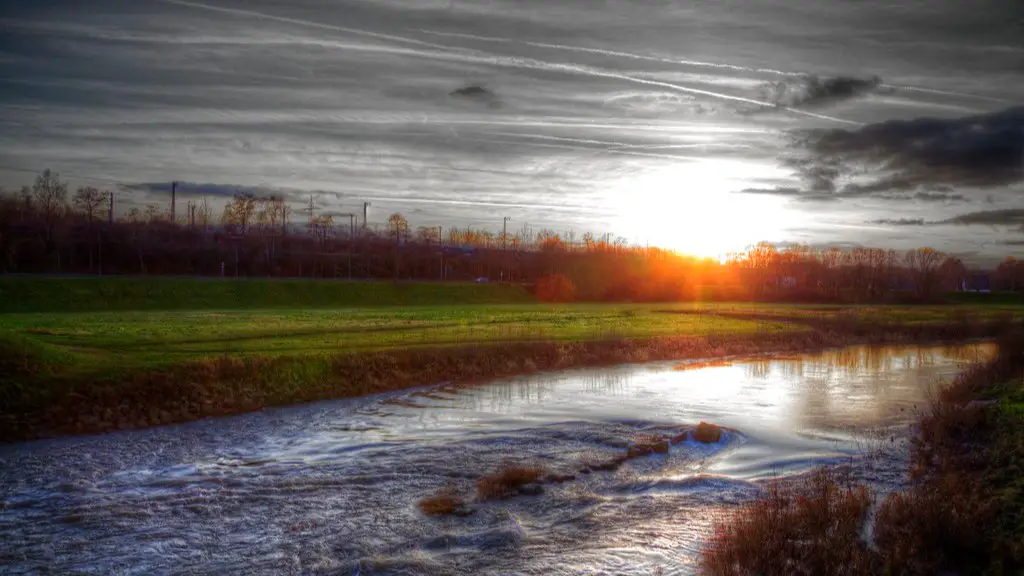Benefits of Homeland Security Protecting the Mississippi River
The Mississippi River is one of the most important rivers in the United States, both economically and culturally. For millions of people from Illinois to Louisiana, it is a source of vital drinking water, recreation opportunities, transport, and food. As a vital economic and ecological resource, the river must be protected from threats both natural and man-made. In order to ensure this, the Department of Homeland Security (DHS) provides comprehensive protection of the Mississippi River.
The DHS is the federal department responsible for ensuring the security of our nation and its resources. It is responsible for coordinating with other federal, state, and local law enforcement agencies to provide protection and security along the Missippi River by providing specialized security forces, surveillance systems, and other measures. This includes building a robust network of sensors and cameras to monitor the river and detect any suspicious activity along its banks.
One of the key ways that the DHS protects the Mississippi River is by deploying trained security personnel to patrol boats, bridges, and other vital infrastructure. These personnel are tasked with identifying and responding to any potential threats or suspicious activity that may arise. The DHS also deploys technology such as advanced surveillance systems along the riverbanks to detect any unusual activity. All of these measures help to ensure that the Mississippi River is safe and secure.
The DHS also works with local authorities and the Army Corps of Engineers to provide additional security measures. This includes implementing waterway restrictions to limit access to sensitive areas and providing advanced warning systems to notify locals of any potential danger. Additionally, the DHS works in cooperation with the National Weather Service to ensure that potential floods and other natural disasters that could cause significant damage are mitigated.
In addition to protecting the Mississippi River from potential threats, the DHS also provides a number of resources to help mitigate environmental degradation and provide economic opportunities. The DHS works with a number of federal and state agencies to ensure that development along the Mississippi River is done responsibly and that natural resources, such as wildlife and fisheries, are protected. Additionally, the DHS funds research and development into renewable energy sources that can help protect and conserve the natural environment along the river.
Overall, it is clear that the DHS provides comprehensive protection for the Mississippi River. With specialized security forces, advanced technology, and a variety of resources, the DHS ensures that the Mississippi River remains a vital economic and ecological resource. This ensures that citizens of the region can continue to enjoy the benefits of the river safely and securely.
Impacts of DHS Protection
The DHS’s protection of the Mississippi River plays an important role in preserving the economic and ecological health of the region. By ensuring that the river remains safe and secure, the DHS helps to ensure that citizens of the region can continue to benefit from its resources. The DHS’s comprehensive security measures help to ensure that the river is safe and secure, while also helping to support local businesses and promote economic development.
In addition to the economic benefits of DHS protection, the river is also an important natural resource. By providing additional security and monitoring, the DHS helps to ensure that the river remains healthy and sustainable. Furthermore, the DHS’s initiatives to help mitigate environmental damage and promote renewable energy sources helps to ensure that the river remains a viable asset for many generations to come.
The DHS’s system of protection also helps to ensure the safety of citizens of the region. Through its surveillance systems and security forces, the DHS can quickly detect and respond to any potential threats. This provides citizens with a sense of security and helps to ensure that citizens can use the river safely and responsibly.
Overall, it is clear that the DHS plays an important role in protecting the Mississippi River. By providing specialized security forces, advanced monitoring and surveillance, and additional resources, the DHS helps to ensure that the river remains a vital economic and ecological asset for years to come. In addition, the DHS’s measures also help to protect the safety and security of local citizens.
Challenges in DHS Protection
Despite the numerous benefits that the DHS provides in terms of protecting the Mississippi River, there are still some challenges to be faced. One of the primary challenges is that the DHS must be able to identify potential threats and respond to them quickly and effectively. This can be complicated by the fact that the river is a large and complex system, and monitoring the entire length of the river can be expensive and time-consuming.
In addition, due to the size and complexity of the river, it can be difficult for the DHS to coordinate with other agencies that may be responsible for protecting and monitoring different parts of the system. For example, the Army Corps of Engineers may be responsible for protecting certain parts of the river, while the National Weather Service may be responsible for tracking weather-related threats. Coordinating between all of these agencies can be a challenge.
Furthermore, the DHS must ensure that its security measures are not overly intrusive of citizens’ rights. The DHS must ensure that its security measures are both effective and respectful of the rights of the citizens of the region. This can be a complex task, and ensuring that balance can be difficult.
Finally, the DHS must be able to respond quickly to any potential threats. This requires the DHS to be constantly vigilant in monitoring the river and responding to any potential threats. This can be a difficult and expensive task, and requires the DHS to constantly assess and adjust its security measures.
Changes over Time in DHS Protection
Over the years, the DHS has implemented various changes to its system of protection for the Mississippi River. In recent years, the DHS has made numerous advancements in the areas of surveillance and monitoring, in order to enhance the security of the river. This includes installing a robust network of sensors and cameras to monitor the river, as well as utilizing advanced techniques such as satellite and drone imagery to detect any suspicious activity.
The DHS has also strengthened its system of coordination with other federal, state, and local law enforcement agencies. This includes providing more resources to existing agencies, as well as working with state and local officials to ensure that all of the necessary security measures are in place. Additionally, the DHS has worked with the Army Corps of Engineers to develop new waterway restrictions to limit access to sensitive areas.
In addition, the DHS has introduced a variety of additional resources to help improve the economic and ecological health of the region. This includes funding research into renewable energy sources, as well as providing assistance to local businesses that rely on the river. Additionally, the DHS has worked with the National Weather Service to ensure that potential floods and other natural disasters are mitigated as much as possible.
Overall, it is clear that the DHS has undergone numerous changes over the years in order to improve its protection of the Mississippi River. With its specialized security forces, advanced technology, and a variety of resources, the DHS is able to provide comprehensive protection of the river, while also helping to protect the economic and ecological health of the region.
Conclusion
In conclusion, it is clear that the Department of Homeland Security plays an important role in protecting the Mississippi River. With its specialized security forces, advanced technology, and a variety of resources, the DHS is able to provide comprehensive protection of the river, while also helping to protect the economic and ecological health of the region. It is clear that the DHS’s efforts are important for ensuring that the Mississippi River remains a safe and secure resource for generations to come.



